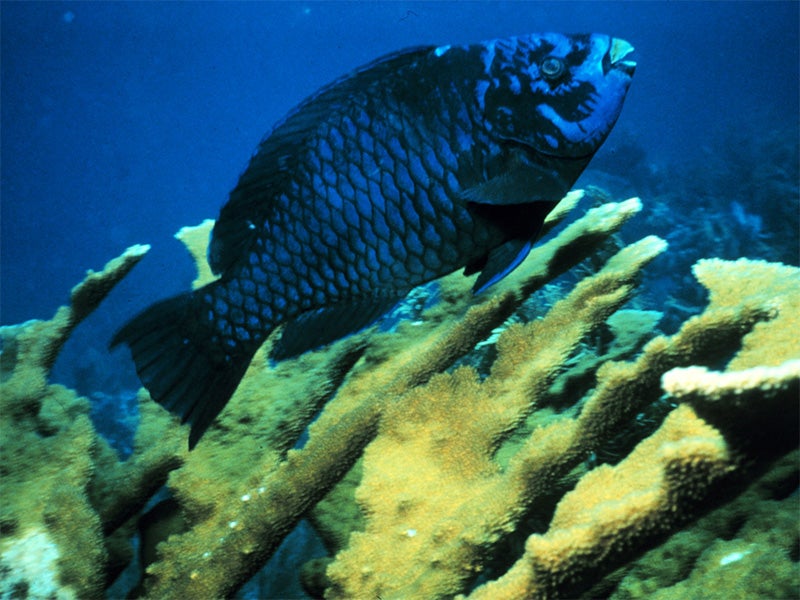Coral Reefs Are in Trouble. Here’s Why I’m Still Hopeful.
We keep seeing evidence that corals can survive, become more resilient, and even recover if we give them a chance. We have the power to make that choice.
A smile spread across my face as I read about a few “urban corals” off the Miami coast that are thriving, despite distinctly suboptimal water quality. Coral reefs off the southern Florida coast have suffered from water pollution and disease linked to ill-advised dredging projects and woefully inadequate regulations. But these hearty little coral colonies provide a spark of hope. And that spark needs oxygen.
What does it mean to work toward a resilient, abundant world in the face of global biodiversity and climate crises? It has to mean more than just holding the line, staving off the “inevitable.” What if, faced with loss and chaos, we demanded more? As Urban Ocean Lab Co-Founder Ayana Elizabeth Johnson asks, what if we get it right?
It’s no secret that coral reefs are in trouble. I’ve witnessed the breathtaking decline of Florida reefs in my lifetime. When I was little, my parents would pack us into the old station wagon and drive down to the Florida Keys for a week of snorkeling in North America’s only coral barrier reef. Already, the old-timers down there were shaking their heads over how much life the reef had lost, but to me it was a wonderland. Thickets of staghorn coral and patches of brain coral, all flitting with jewel-colored baby angelfish, damselfish, butterflyfish. I’d float in one spot, just watching the commerce and drama of the coral city unfold, until I was pruny and sunburned and my parents finally hauled me back to dry land.
As a college senior getting scuba certified, I revisited some of those spots and saw less coral, more algae, fewer fish. But still a lively scene. When I returned in 2009 after a coral conference, my heart sank. Carpets of algae had crowded out the coral in shallower spots. Folks on the dive boat who’d never seen these reefs exclaimed over the lovely fish. But, to me, it felt like a ghost of its former self.
So why hope? Because we keep seeing evidence that corals can survive, become more resilient, and even recover if we give them a chance by cleaning up water quality, protecting them from coastal development and dredging, and reducing fishing pressure. And because we have the power to make those decisions.
We have to start by learning what a truly healthy reef community looks like and re-imagining the policy frameworks that will get us there. It starts with demanding the right to an abundant world: a world where flora and fauna thrive, biodiversity is increasing, ecosystems support the human communities that interact with them and vice versa. A world where everyone has access to that bounty regardless of wealth, skin color, or nationality.
It means demanding that all levels of government treat public resources as if they belong to the public, making leaders understand that the public is entitled to a bountiful public trust, not just the scraps left over after politically powerful industries have taken their fill.
We are working on creating that world by re-imagining the policies that will get us there. We’re urging the federal government to take an all-hands-on-deck approach to building coral resilience, using its authority to clean up watersheds, reform the way we manage fishing, and restore reefs.
What would effective policies look like? They would put an end to dirty fossil fuel extraction and speed a sustainable and just transition to renewable energy. Fishery management would turn away from the failed how-much-can-we-extract model towards a common-sense approach that recognizes every creature has role in building healthy ecosystems. That ecosystem-honoring approach would protect the algae-eating creatures that clear the way for corals to grow, sharks and other top predators that regulate the food chain, and smaller fish — “energy bars of the sea”— that feed marine food webs.
We would rightfully shift the costs of overfishing, extraction, and pollution control to the industries that profit from exploiting our public resources. It’s unjust to put that burden on the very communities suffering from that exploitation.
We would focus on restoring the coral reefs, marshes, seagrasses, kelp forests, and other coastal habitats that bolster biodiversity, store blue carbon, provide storm and flood protection — and joy.
Beyond all the statistics and dollar signs, joy may be the most potent and durable motivator. As I look at the state of our reefs and their capacity to rebound, I experience a curious alchemy of joy and love and rage that transforms into hope. And it strikes me that hope is not simply a thing to have, but a thing we must create by fighting for all that we love and deserve. Our oceans depend on it.
Earthjustice’s Oceans Program uses the power of the law to safeguard imperiled marine life, reform fisheries management, stop the expansion of offshore oil and gas drilling, and increase the resiliency of ocean ecosystems to climate change.
Julie Hauserman
Public Affairs and Communications Strategist, Earthjustice
jhauserman@earthjustice.org
